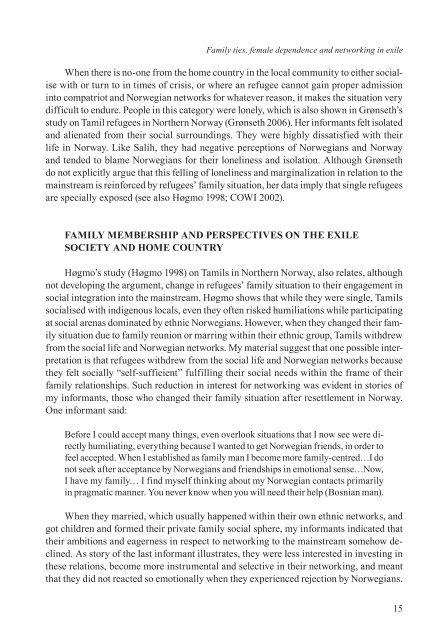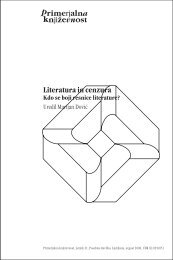30 • 2009 - Dve domovini / Two Homelands - ZRC SAZU
30 • 2009 - Dve domovini / Two Homelands - ZRC SAZU
30 • 2009 - Dve domovini / Two Homelands - ZRC SAZU
You also want an ePaper? Increase the reach of your titles
YUMPU automatically turns print PDFs into web optimized ePapers that Google loves.
Family ties, female dependence and networking in exile<br />
When there is no-one from the home country in the local community to either socialise<br />
with or turn to in times of crisis, or where an refugee cannot gain proper admission<br />
into compatriot and Norwegian networks for whatever reason, it makes the situation very<br />
difficult to endure. People in this category were lonely, which is also shown in Grønseth’s<br />
study on Tamil refugees in Northern Norway (Grønseth 2006). Her informants felt isolated<br />
and alienated from their social surroundings. They were highly dissatisfied with their<br />
life in Norway. Like Salih, they had negative perceptions of Norwegians and Norway<br />
and tended to blame Norwegians for their loneliness and isolation. Although Grønseth<br />
do not explicitly argue that this felling of loneliness and marginalization in relation to the<br />
mainstream is reinforced by refugees’ family situation, her data imply that single refugees<br />
are specially exposed (see also Høgmo 1998; COWI 2002).<br />
FAMILY MEMBERSHIP AND PERSPECTIVES ON THE EXILE<br />
SOCIETY AND HOME COUNTRY<br />
Høgmo’s study (Høgmo 1998) on Tamils in Northern Norway, also relates, although<br />
not developing the argument, change in refugees’ family situation to their engagement in<br />
social integration into the mainstream. Høgmo shows that while they were single, Tamils<br />
socialised with indigenous locals, even they often risked humiliations while participating<br />
at social arenas dominated by ethnic Norwegians. However, when they changed their family<br />
situation due to family reunion or marring within their ethnic group, Tamils withdrew<br />
from the social life and Norwegian networks. My material suggest that one possible interpretation<br />
is that refugees withdrew from the social life and Norwegian networks because<br />
they felt socially “self-sufficient” fulfilling their social needs within the frame of their<br />
family relationships. Such reduction in interest for networking was evident in stories of<br />
my informants, those who changed their family situation after resettlement in Norway.<br />
One informant said:<br />
Before I could accept many things, even overlook situations that I now see were directly<br />
humiliating, everything because I wanted to get Norwegian friends, in order to<br />
feel accepted. When I established as family man I become more family-centred…I do<br />
not seek after acceptance by Norwegians and friendships in emotional sense…Now,<br />
I have my family… I find myself thinking about my Norwegian contacts primarily<br />
in pragmatic manner. You never know when you will need their help (Bosnian man).<br />
When they married, which usually happened within their own ethnic networks, and<br />
got children and formed their private family social sphere, my informants indicated that<br />
their ambitions and eagerness in respect to networking to the mainstream somehow declined.<br />
As story of the last informant illustrates, they were less interested in investing in<br />
these relations, become more instrumental and selective in their networking, and meant<br />
that they did not reacted so emotionally when they experienced rejection by Norwegians.<br />
15

















